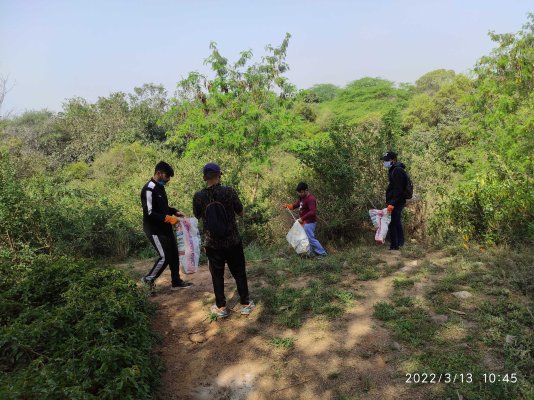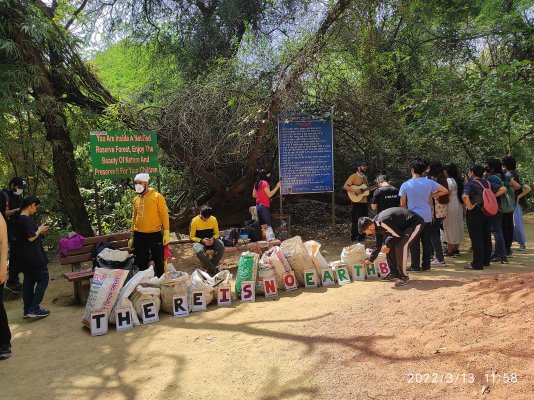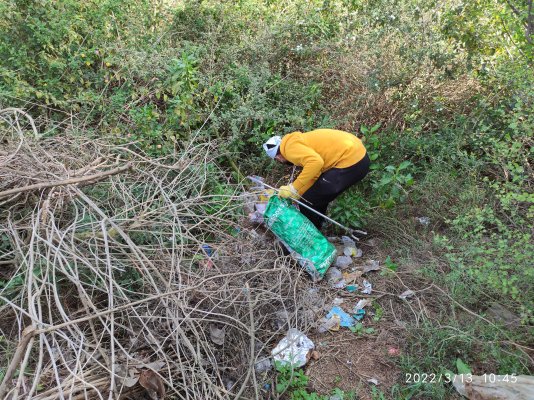- About
- Topics
- Picks
- Audio
- Story
- In-Depth
- Opinion
- News
- Donate
-
Signup for our newsletterOur Editors' Best Picks.Send
Read, Debate: Engage.
| November 28, 2022 | |
|---|---|
| topic: | Deforestation |
| tags: | #India, #deforestation, #afforestation, #conservation, #grassroots activism, #COP26 |
| located: | India |
| by: | Sanjana Chawla |
Deforestation, loss of forest cover and rising pollution are among the top climate issues India is facing. According to Global Forest Watch, India witnessed a decline of 2.8 percent of its tree cover between 2001 and 2021 due to deforestation.
The diversion of forest lands for development, industrialisation and the construction of settlements, roads, irrigation projects and eco-tourism centres has greatly contributed to increasing rates of forest loss.
In 2020 alone, forest loss figures in India were as high as 20,809 hectares.
Despite the evident damage and mounting concern, India refused to sign the Declaration on Forests and Land Use, also known as the Deforestation Declaration at COP26 last year.
India's capital Delhi, which is fairly rich in resources and green cover, has also been on the receiving end of environmental damage and loss of greenery, as it saw a 4.6 percent decrease (equivalent to 12 ha) in tree cover over the last two decades.
Furthermore, most of Delhi's remaining green spaces are non-forest or non-viable areas - with less than 0.1 percent covered with plantations and natural forest cover.
The sharp decrease in the capital's forest cover is largely attributed to rampant exploitation of available resources, overuse of energy, upcoming developmental projects, a shifting political climate and incessant deforestation.
Not only has Delhi failed to take any meaningful steps to improve the situation, but it unveiled a new plan to clear a forest, with the Delhi Development Authority (DDA) proposing to convert Sanjay Van into an eco-tourism hub.
One of the city's last remaining green spaces, Sanjay Van is a sprawling forest in southern Delhi spanning over 780 acres of land.
It is a home to various rare species of flora and fauna, including jackals, nilgais, the Indian paradise flycatcher, the white-throated kingfisher, the Indian silverbill and the Asian koel, amongst others.
The upcoming eco-tourism and recreational hub will reportedly include event spaces, restaurants and a camping site, and offer activities such as rock climbing, paragliding, zip-lining, canopy tours and aerial trails.
As part of the project's Public-Private partnership model, the authorities have joined forces with private actors and developers to clear the forest and construct a new infrastructure.
While the Delhi authorities have stated that the centre's objectives are learning, community engagement and awareness, critics are doubtful. To them, the privatisation of Delhi's forests highlights the prioritisation of profit over the conservation of natural lands that bear great cultural significance and are vital for the survival of countless species, including humankind.
To stress their point, they call attention to the extensive damage caused to Sanjay Van by the project's activities and commercial interests.
A great deal of industrial and household waste, sewage water and effluent waste are directly disposed of and discharged in and around Sanjay Van. This has already impacted the health of the forest's trees and vegetation, and has led to soil erosion and groundwater depletion.
The forest has also become a dump yard for waste disposal and high volumes of trash, most of which is un-recyclable plastic.
Furthermore, in a city like Delhi, where air pollution is perennial crisis, the shedding of the existing forest covers is expected to make air quality even worse.
There Is No Earth B, a community of young men and women, has been mobilising people from across India to combat the commercialisation of the Sanjay Van.
Founded in 2018, There Is o Earth B is a pan-India movement working to protect the climate and environment. Designating the preservation and safeguarding of Delhi's Sanjay Van as its core mission, this group of volunteers says it is advocating for a sustainable, equitable, organic and inclusive environment.
Its members conduct weekly clean up and plantation drives in Sanjay Van and in other locations across the country that are suceptible to waste pollution.
Open defecation, waste-dumping and logging are among the top systemic issues There Is No Earth B tries to address through community supported and funded measures.
Speaking to FairPlanet, Sania Rehmani, the movement's director, said, "We are working to stop the conversion of Sanjay Van into a hub as it is bound to result in a huge environmental damage and also cause erosion and loss of species."
"We have written letters and mobilised locals of Delhi to speak up via petition emails [2,062 emails have been sent to the Lieutenant Governor of Delhi so far] to the concerned authorities," Rehmani said, adding that they have alerted them about the grave danger the project will cause to one of Delhi's last remaining spots of biodiversity.
The group is also credited with conducting regular workshops, rallies and street plays on climate change and environmental awareness.
"We ensure that all the plastics collected from clean-up drives are carefully segregated based on their reusability," Rehmani said, commenting on the group's clean up drives.
"We also send the plastic collected from clean-up drives in the national capital to the Indian Pollution Control Association (IPCA) that further processes the waste."
According to a report released by the Union Ministry of Earth Sciences (MoES), India’s natural ecosystems, resources, biodiversity, water, food, energy and agricultural outputs are stressed and impacted by current climate and environmental trends.
The report recommends placing greater emphasis on and drafting policies around the protection of forests and proliferation of urban green spaces in order to minimise and reduce environmental burden and damage.
While several capacity building measures, land restoration, and conservation goals are being undertaken and propagated by the Indian government, not all solutions and strategies are implemented optimally, and experts urge that conservation efforts be enforced as quickly and stringently as possible
A 2020 research by the Observer Research Foundation also contends that "cessation of land use change, work on forest conservation with greater urgency, more focused land restoration, and forest plantations are needed to achieve forest regeneration.
In addition to policy and the development of institutional mechanisms by the government, the report also highlights the empowerment of local communities and inclusion of women and young activists as other important factors in working towards effective afforestation.
Image by There Is No Earth B.
By copying the embed code below, you agree to adhere to our republishing guidelines.



